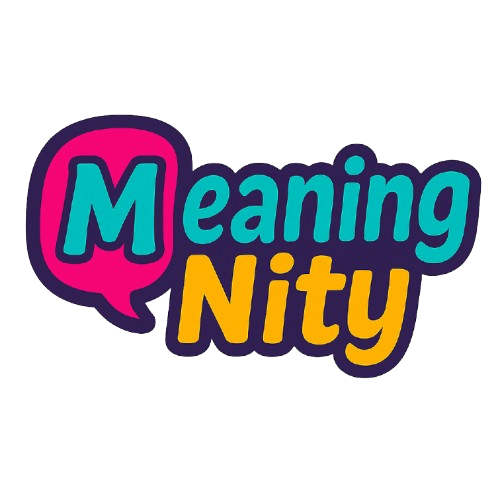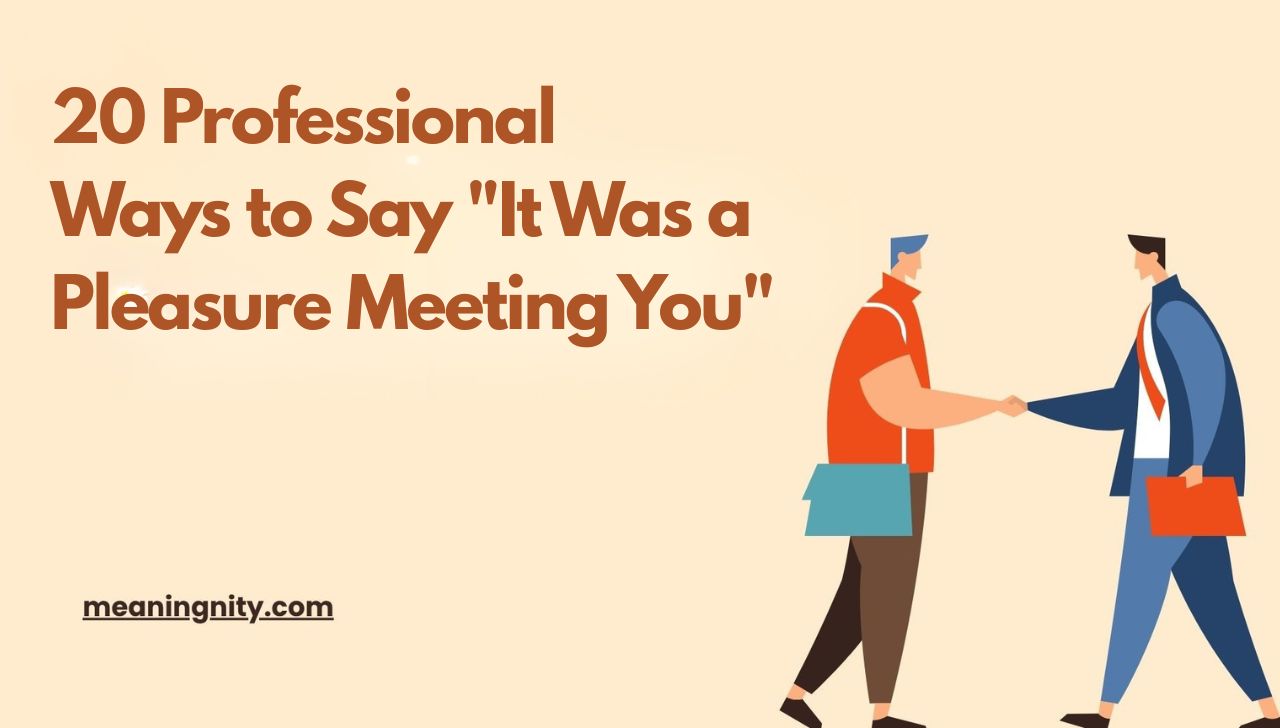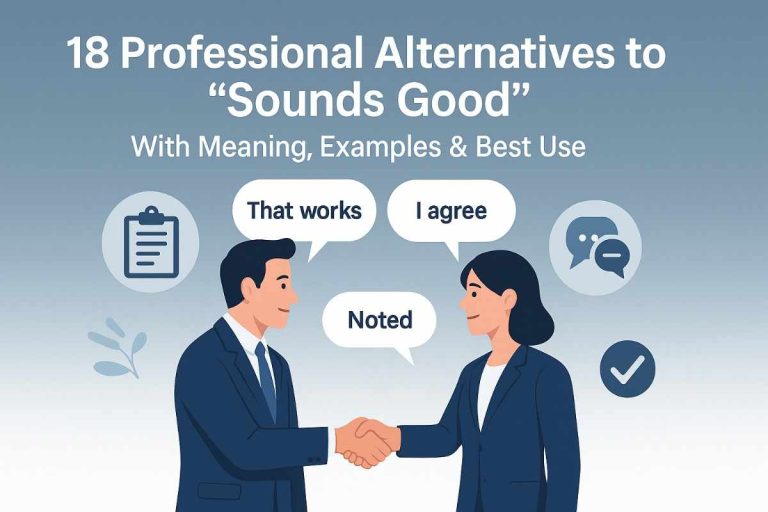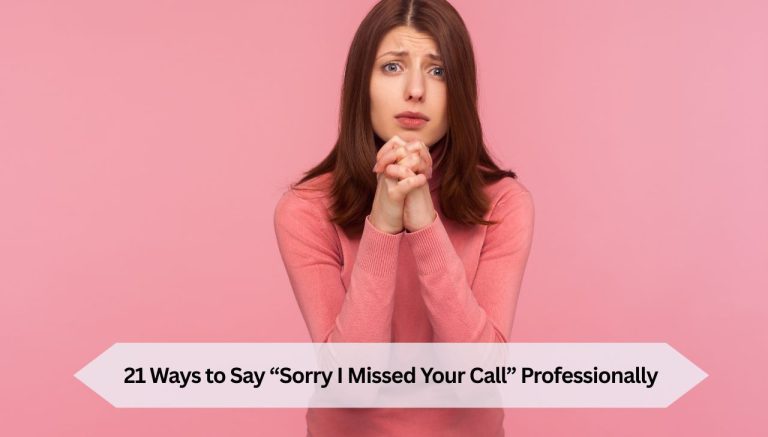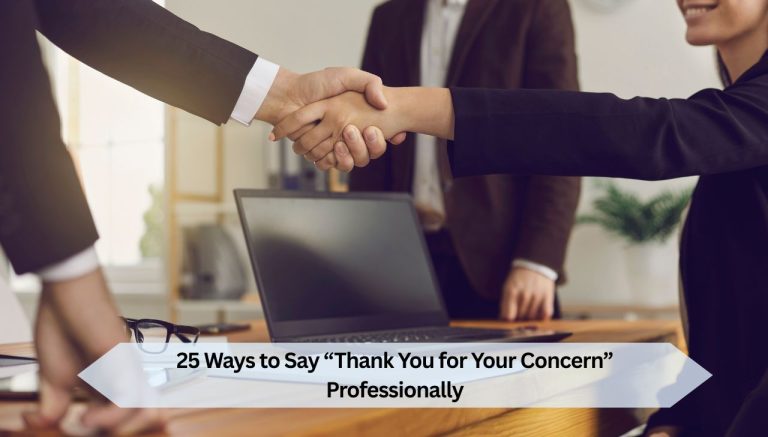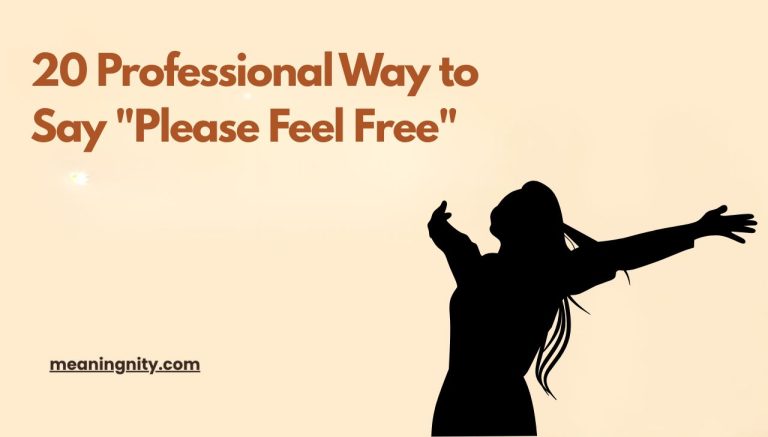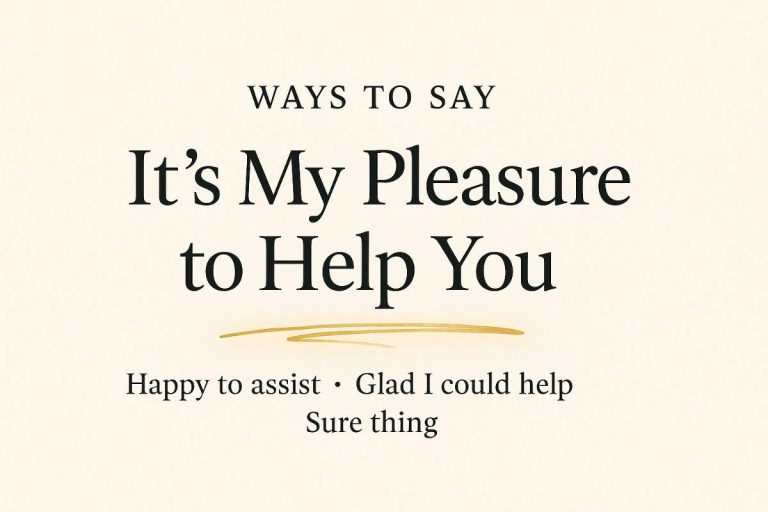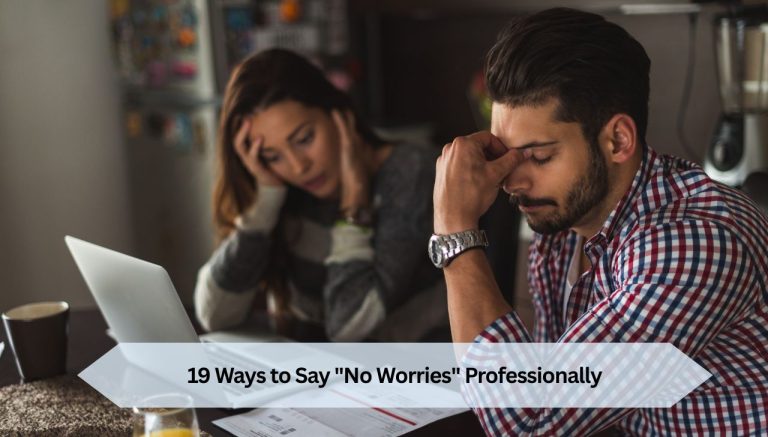20 Professional Ways to Say “It Was a Pleasure Meeting You”
In the business world, your words matter. When you meet someone for the first time, how you close the conversation can leave a lasting impression. “It was a pleasure meeting you” is a polite and safe choice. But there are other ways to express the same sentiment, and using varied expressions can make your interactions feel more personal.
In this article, we’ll explain the meaning of “It was a pleasure meeting you” and give you 20 professional alternatives. We’ll also share when to use them and when not to. By the end, you’ll have a wide range of phrases to use in different business situations.
What Does “It Was a Pleasure Meeting You” Mean?
“It was a pleasure meeting you” is a common phrase used to show appreciation after meeting someone for the first time. It’s a way to convey that you enjoyed the interaction and look forward to further conversations. This phrase is often used in professional settings, like during business meetings or networking events.
Example:
“It was a pleasure meeting you at the conference. I hope we can collaborate on the next project.”
The phrase is friendly but formal. It’s perfect when you want to wrap up the conversation without sounding too casual.
When to Use “It Was a Pleasure Meeting You”
While this phrase works in many situations, it’s not always the best option. It’s best used when:
- At networking events: After meeting a new colleague or potential client.
- Post-interviews: When wrapping up a job interview or a meeting with a recruiter.
- After formal meetings: If you’ve had a productive conversation with someone you may want to connect with in the future.
- In customer-facing situations: If you’ve met a client or business partner for the first time.
But let’s face it, sometimes you want to sound more engaging or less formal. That’s when alternatives come in handy.
20 Professional Ways to Say “It Was a Pleasure Meeting You”
Here are 20 alternatives to “It was a pleasure meeting you.” Each one is perfect for different situations, whether you need something more casual, formal, or specific to your industry.
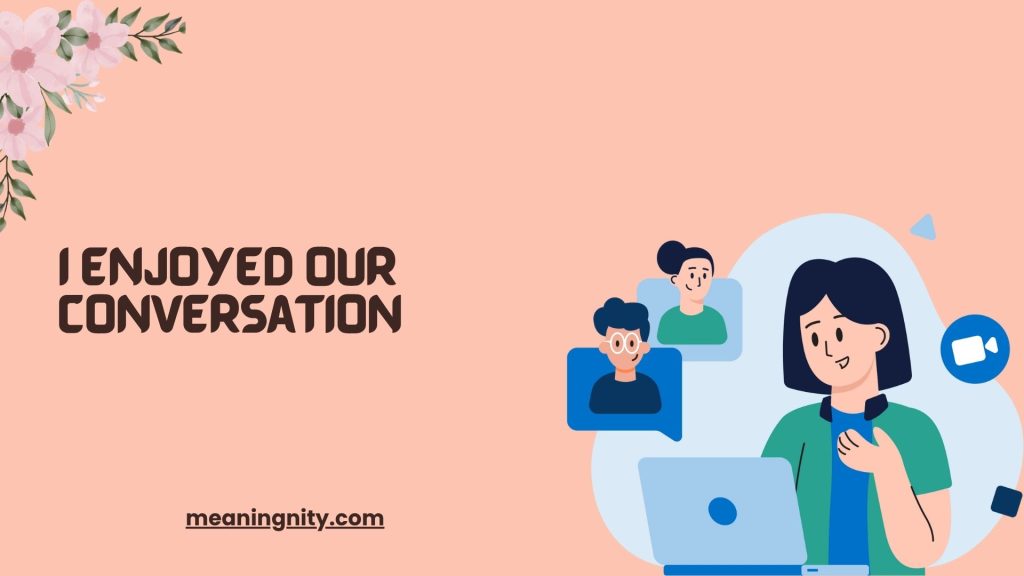
1. “I Enjoyed Our Conversation”
- Meaning: You found the discussion interesting or valuable.
- Best Use: When the conversation was engaging or informative.
- Worst Use: If the conversation was brief or awkward.
- Tone: Casual but still polite.
2. “It Was Great to Meet You”
- Meaning: A straightforward way to express that meeting was enjoyable.
- Best Use: In almost any casual or formal setting.
- Worst Use: In very formal contexts where a more specific phrase is needed.
- Tone: Friendly and warm.
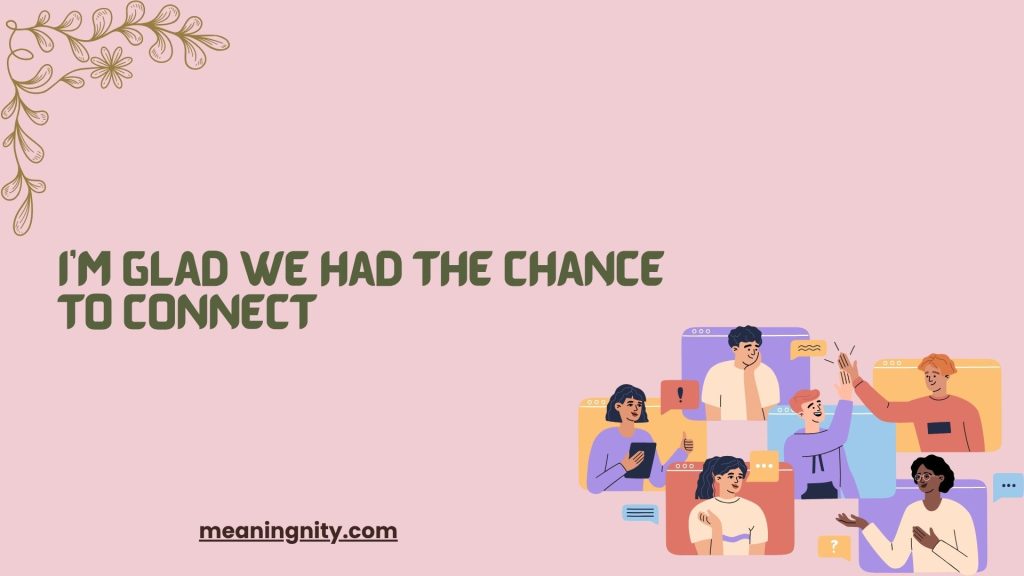
Find Out More: 27 Ways to Say ‘Just a Heads Up’ Professionally
3. “I’m Glad We Had the Chance to Connect”
- Meaning: Acknowledge the opportunity to meet and network.
- Best Use: After networking events or conferences.
- Worst Use: In short, formal meetings.
- Tone: Positive and open.
4. “It Was a Pleasure Speaking with You”
- Meaning: Emphasizes that the conversation itself was enjoyable.
- Best Use: After a deep or meaningful conversation.
- Worst Use: In brief or transactional conversations.
- Tone: Professional and polite.
5. “I Look Forward to Working Together”
- Meaning: Expresses interest in future collaboration.
- Best Use: After meeting someone who could be a potential collaborator.
- Worst Use: If you’re unsure about future interactions.
- Tone: Optimistic and forward-looking.
6. “I Appreciate You Taking the Time to Meet”
- Meaning: Shows gratitude for their time and attention.
- Best Use: After a formal meeting or interview.
- Worst Use: In casual or quick interactions.
- Tone: Respectful and appreciative.
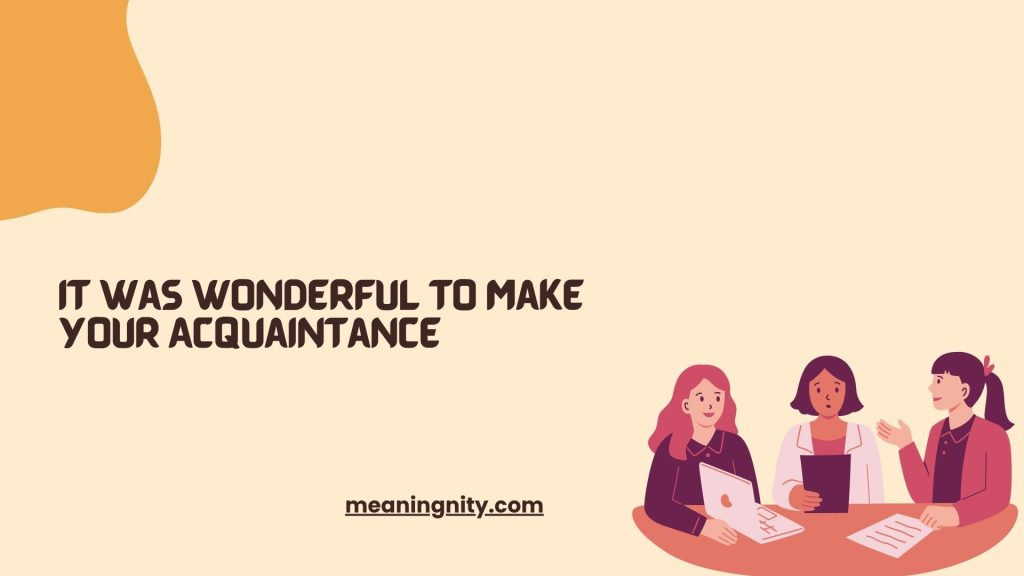
Explore This Topic: 24 Ways to Say “Sorry to Bother You” Professionally
7. “It Was Wonderful to Make Your Acquaintance”
- Meaning: A more formal way to express you enjoyed meeting someone.
- Best Use: In very formal settings or when meeting senior professionals.
- Worst Use: In casual settings or less formal meetings.
- Tone: Formal and respectful.
8. “I Enjoyed Meeting You”
- Meaning: A simple and effective way to show you enjoyed the meeting.
- Best Use: When the meeting was pleasant but not overly formal.
- Worst Use: If the conversation was uncomfortable or brief.
- Tone: Neutral and friendly.
9. “I’m Glad We Could Connect”
- Meaning: Acknowledges the value of the connection.
- Best Use: After networking or an introduction.
- Worst Use: If the meeting was purely transactional.
- Tone: Polite and approachable.
10. “It Was Great Getting to Know You”
- Meaning: Suggests a more personal interaction, implying that you learned something valuable.
- Best Use: When you had a more involved conversation.
- Worst Use: In formal, quick meetings.
- Tone: Warm and engaging.
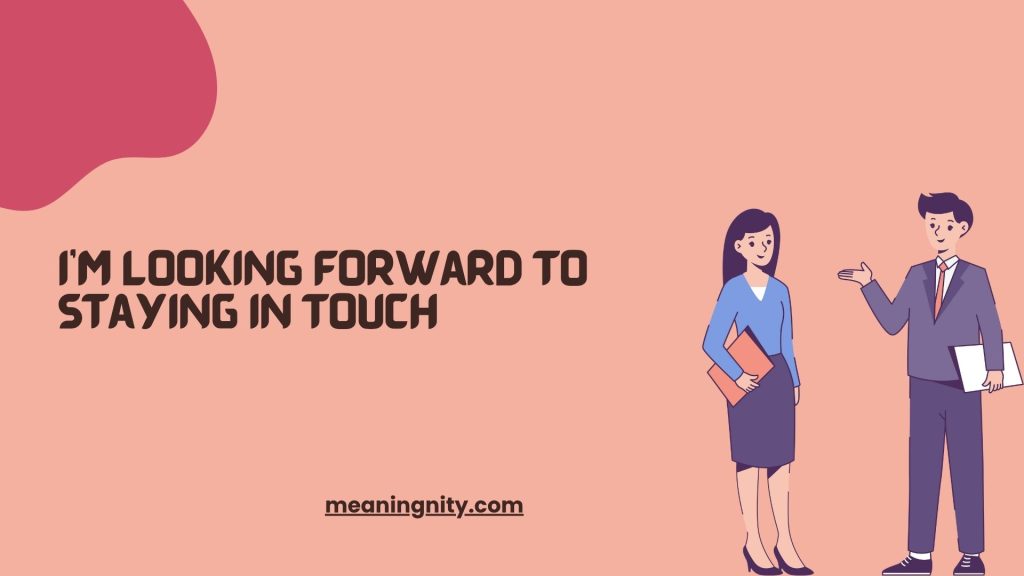
11. “I’m Looking Forward to Staying in Touch”
- Meaning: Shows you want to continue the relationship.
- Best Use: After networking or discussing future plans.
- Worst Use: If you have no intention of staying in contact.
- Tone: Friendly and optimistic.
12. “I Appreciate Your Insights Today”
- Meaning: Acknowledge the value of the other person’s knowledge.
- Best Use: After a conversation where the other person shared valuable information.
- Worst Use: If the conversation was not focused on sharing knowledge.
- Tone: Professional and grateful.
13. “It Was Nice Making Your Acquaintance”
- Meaning: A formal expression of appreciation for the meeting.
- Best Use: After meeting someone in a formal or business context.
- Worst Use: In casual settings or informal meetings.
- Tone: Formal and respectful.
14. “It Was Great to Finally Meet”
- Meaning: Ideal if you’ve communicated before but are meeting in person for the first time.
- Best Use: After a series of emails, phone calls, or virtual meetings.
- Worst Use: When you’ve never communicated before.
- Tone: Friendly and light.
15. “I Hope We Can Collaborate Soon”
- Meaning: Expresses enthusiasm about future collaboration.
- Best Use: After meeting a potential business partner or colleague.
- Worst Use: If collaboration isn’t on the horizon.
- Tone: Optimistic and enthusiastic.
16. “It Was a Privilege to Meet You”
- Meaning: A formal way of saying you respect the person you met.
- Best Use: When meeting someone senior or highly respected in your industry.
- Worst Use: In casual or informal meetings.
- Tone: Formal and respectful.
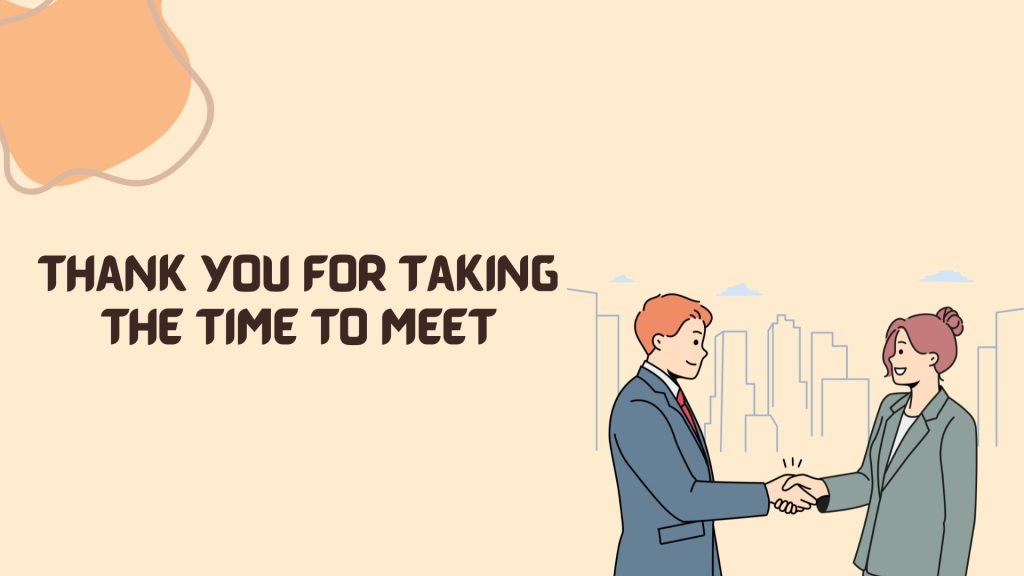
Check This Out: 21 Ways to Say “Sorry I Missed Your Call” Professionally
17. “Thank You for Taking the Time to Meet”
- Meaning: A polite way to thank someone for their time.
- Best Use: After a formal meeting or interview.
- Worst Use: In very casual meetings.
- Tone: Grateful and professional.
18. “I Look Forward to Connecting Again”
- Meaning: A subtle way to suggest you’d like to meet again.
- Best Use: After networking or meeting someone with whom you’d like to stay in touch.
- Worst Use: When there is no clear reason to meet again.
- Tone: Friendly and forward-thinking.
19. “It Was Great to Meet You and Learn More About Your Work”
- Meaning: Indicates you appreciated the conversation and gained insight.
- Best Use: After meeting someone who works in a related field or industry.
- Worst Use: If the conversation wasn’t about work or didn’t involve sharing knowledge.
- Tone: Professional and appreciative.
20. “I’m Glad We Had the Opportunity to Meet”
- Meaning: A simple expression of gratitude for the meeting.
- Best Use: In both formal and informal settings.
- Worst Use: If you want something more impactful or specific.
- Tone: Neutral and polite.
Simple and Polite Responses to “It Was a Pleasure Meeting You”
If someone says, “It was a pleasure meeting you,” here are some polite responses you can use:
- “Likewise, it was great to meet you too.”
- “I feel the same, thank you for your time.”
- “The pleasure was mine.”
- “It was nice meeting you as well.”
- “I enjoyed our conversation too.”
These responses are simple and show appreciation for the meeting.
Conclusion
While “It was a pleasure meeting you” is a solid and polite option, it’s worth expanding your vocabulary to keep your professional interactions fresh and engaging. With these 20 alternatives, you’ll be able to tailor your closing remarks to fit any situation, whether it’s formal, casual, or future-focused.
By varying your language, you show that you value the interaction and make a memorable impression. So next time you wrap up a meeting or conversation, try one of these alternatives to leave a lasting impact.
